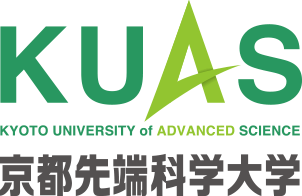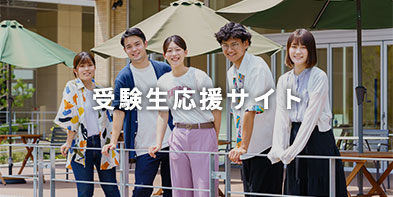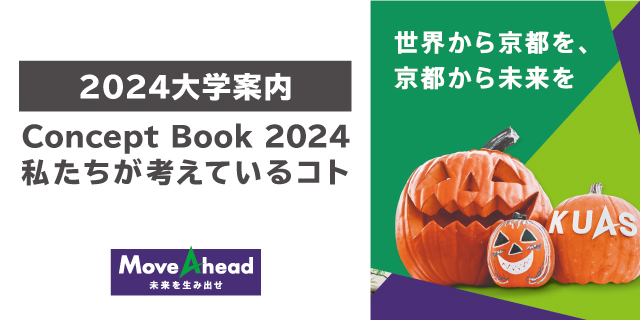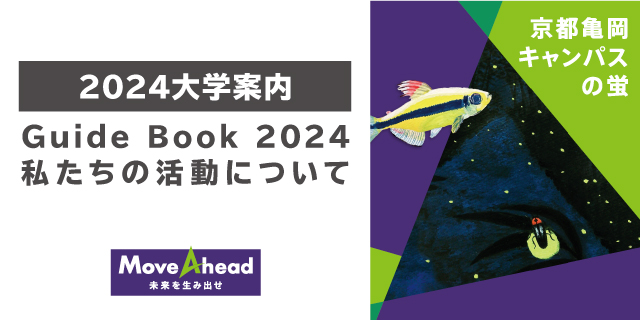京都先端科学大学の学生・教職員の皆さんへ
学長 前田 正史
春学期の授業が終盤に入るこの段階で、皆さんにこれまでのこと、そしてこれからのことについてお話ししたいと思います。
大学生・大学院生の皆さんへ
新型コロナウイルス感染症の影響拡大に伴い、4月の入学式は中止となり、登校することもままならず、皆さんは先行きの見えない中、不安を抱かれていたと思います。とりわけ新入生の皆さんの心中は察するに余りあります。
本学では、春学期の授業を予定どおり開始しました。ただ、対面授業は行わず、遠隔授業です。そして感染拡大防止を徹底し、自習室やPC室、図書室の一部を座席指定しながら利用可能としました。なぜなら、皆さんの修学の機会を失うことがあってはならないからです。教員にとっても、もちろん初めての経験です。手さぐり状態で準備に手間取りましたが、演習や実験を自宅でできる工夫をしたりして、少しずつ環境整備も整ってきています。全体としてはなんとか授業ができるようになってきているのではないでしょうか。皆さんへのアンケートの結果でも「おおむね良い授業が行われている」と評価していただきました。
“ニューノーマル”という言葉を聞いたことがありますか。新常態という意味です。“新しい生活様式”と言われることもあります。コロナ禍において、まさに新しい学びの世界が生み出されたと言ってもよいでしょう。外的な条件が変わることで、そのもの自体のありようが変わる。みなさんにとっては新しい形の学習を経験したのではないでしょうか。オンデマンドの講義では、聞き逃したところ、わからないところは、何度でも聞くことができたでしょう。また、先端なびで課題を与えられ、自習し、レポートを提出する形の講義もあったかと思います。毎回のレポートには大変な思いをしたと思いますが、大教室での講義と小テストと違い十分時間を掛けて学習できたのではないでしょうか?全ての方のネット環境が必ずしも十分でないこともあり、オンライン授業は限られておりますが、皆さんが自室から講義に参加し、先生方も自宅から映像で参加する授業があったかもしれません。もしかしたら、大人数なのに、少人数クラスのような緊張感もあったのではないでしょうか?遠隔授業については、これからも、皆さんの意見を聞きながら、より大きな学習効果が得られる工夫を重ねていきたいと思います。
しかし、大切なことは、大学はさまざまな人と出会い、ともに学ぶ場である、ということです。新型コロナウイルス禍の出現によって、自由に歩き回ったり、みんなで話し合ったり、スポーツをするという、これまで当たり前だったことが制限されました。この“当たり前”だったことがいかに大切なことだったか、実感されたと思います。本学では京都府の休業要請解除を受け、6月1日から原則登校禁止を解除し、6月11日からは1年生と4年生を対象とするゼミ、実習、研究などにおいて、一部、対面授業を開始しています。もちろん、密を避けること、感染防止の3つの基本(身体的距離の確保、マスク着用、手洗い)を守り、感染防止に努める事は当然です。再び全国で感染者が増えはじめております。With Coronaの状態が当分の間、続くだろうことは想像に難くありません。本学では、今回の経験をむしろチャンスととらえ、遠隔教材のさらなる充実や、ネット環境の整備を進め、リアルとサイバーの両方の充実を進めていくことができればと考えています。サイバーが意味を持つのはリアルがあってこそ、ということも忘れてはなりません。
秋学期からの活動については、まだはっきりしたことは言えません。遠隔と対面による活動の組み合わせになることははっきりしていますが、私としては許される限り、対面授業を入れ込んでいきたいと思っています。残念ながらサークル活動など大学コミュニティーのface-to-face活動については、しばらくはできないかもしれません。しかし、遠隔でできることもあるでしょう。あきらめることなく、挑戦していただきたいと思います。
学部4年生、修士の2年生にとっては、今は就職活動のまっただ中です。本学、キャリアサポートセンターは一日も休まず活動しています。学生の皆さんはインターンシップ、キャリア相談など、センターに予約した上で、コンタクトをとってください。対面でもできますし、遠隔(オンライン、メール)でももちろん対応できます。まず一歩踏み出してください。そこから次の一歩がはじまり、皆さんの未来につながります。心配は要りません、まずはセンターに連絡してください。
新型コロナウイルス感染症による、生活への大きな影響は、この2月から顕在化し、今に至るまで続いています。いずれは、インフルエンザウイルス感染症のように、治療薬、ワクチンが開発され、現在ほど活動を抑制する必要がなくなると思いますが、今は分別ある行動と活動をお願いしたいと思います。そして、どんな困難な状況になろうとも、ぜひ、皆さんと前を向いて未来をつくり上げる活動をともにしたいと思います。
教職員の皆さんへ
まず最初に、自らも感染リスクの不安を感じながら、学生のため努力いただいた教職員の皆さんに心からお礼を申し上げたいと思います。
新型コロナウイルス感染症により、残念ながら、3月の卒業式、4月の入学式は中止せざるを得ませんでしたが、本学では、健康医療学部長をリーダーとする感染症対策チームをつくり、彼らが作成したマニュアルに従って、3月末の対面でのガイダンス、教科書の配布、4月以降の自習室やPC室の運営を行うことができましたし、対面授業のガイドラインも作成しました。4月から春学期の授業を、遠隔授業ではあるものの予定どおり開始できたのは、ひとえにその準備を教員、職員一丸となって進めていただいたおかげです。
授業の形態が様変わりしています。遠隔による授業は、ある意味、履修主義からの独立とも言えるかも知れません。授業のコマ数を定め、学生が出席することで単位を認定するという伝統的なパラダイムが根底から崩れていると言ってもよいでしょう。学生の皆さんにも申し上げましたが、遠隔が故に緊張感のある講義になっている、あるいはじっくり考える機会ができた、というポジティブな現象もありました。もちろん、対面で行う講義が本質的に重要であることは論を待ちません。教員の「人間力」が学生たちの可能性を開花させ、それには対面による効果は非常に大きいと思います。しかし、今回の経験をチャンスと捉え、新しい形を本学としても構築し、より丁寧な、効果のある教育に踏み出していきたいと思います。
感染症対策に努め、よりよい受講環境をつくるための学生の端末やインターネット環境の整備や、遠隔の小教室をデジタル映像で連結し、バーチャルな大教室として使うシステムを導入する、遠隔授業の教材をさらに充実していく等、できることから早急に進めていきます。
教員や職員の「働き方」も変化しています。これまで対面が原則であった大学内の会議を原則的にオンライン会議としました。このことは会議時間を短縮することになりましたし、記録を自動的にとることができるので、業務改善がこの部分ではできたことになります。対面より雰囲気が伝わりにくいということもあるでしょうが、今後もこの形の会議やテレワークはなくならないでしょう。さらにクオリティを向上させたいと思っています。
新型コロナウイルス感染症の収束が見通せない中、大学構内では、引き続き、抑制的な活動にせざるを得ませんが、建学の精神でもある「これからの社会が目指すべき姿を構想し、その実現に向けた諸課題の解決につながる先端学術研究」をいっそう進めていきたいと思います。研究活動は、緊急事態宣言の解除後、感染予防策を講じながら活動を再開しております。連携研究、共同研究なども同様に活発に進めてもらっています。人と人の接触をなるべく避けながら研究活動を維持することは、それほど困難なことではありません。例えば、人文系や経済経営系では、出勤禁止になり、通勤時間を節約できたので、じっくり自宅で論文を書いたと言う先生もおられました。また、工学部では、在宅学生による、3DCADと3Dプリンターを用いたピンポン球飛ばし競技会を行い、大きな成功がありました。感染症を理由に研究活動が停滞することはあってはならないと思っています。
最後に
本学コミュニティでは、大きな健康被害が出ていないことに感謝します。ひとえに皆さんの注意深い行動と思慮ある活動のおかげであると思います。本学健康医療学部が、この感染症対策に大きな貢献をしたことは言うまでもありません。
しかし、新型コロナウイルス感染症は収束したわけではありません。大都市圏での感染者も増えています。大学の存在意義をいまいちど私たち自身が問い直し、その社会的責任を果たすため、皆さんと一緒に進んでいきたいと思います。
Dear Kyoto University of Advanced Science Students, Faculty and Staff、
As we near the end of spring classes, I would like to reach out to you about what has happened over this semester and what the future has in store.
To Undergraduate Students and Graduate Students:
Due to the impact of the coronavirus, we were not able to hold our entrance ceremony in April, and our students were not able to come to campus for classes. I think that many of you have felt anxious during this time of uncertainty, and I believe that our freshmen in particular had a very hard time.
Although there were no face-to-face lectures, and all students were obliged to take their courses remotely, our spring semester began on schedule. On campus, our faculty and staff worked hard to create safe social distancing policies so that students would at least be able to use our study halls, PC labs, and some areas inside the libraries. These measures were taken to ensure that students would still have access to environments conducive to learning. Of course, this spring was the first time for our faculty to ever experience something like the coronavirus. Though it took our faculty members some time to acclimate, they gradually succeeded in providing students with a good learning environment where everyone could engage in practical studies and lab experiments at home. As a whole, I think that our classes are improving, and when we surveyed our students, the majority answered that their classes were “quite good.”
Have you recently heard the phrase “new normal”? This term refers to the situation we now live in. People also sometimes refer to it as the “post-corona times.” You could say that a new world of learning has been born by the coronavirus pandemic. When external conditions change, life itself must change in response. For example, all of our students are now experiencing a new mode of learning in the form of remote study. With on-demand lectures, students can re-watch parts they missed, or did not understand, as many times as they wish. There were yet other online courses where students were given assignments that requiring independent investigation. Each assignment must have been a challenge, but unlike lectures and the quizzes in a typical lecture hall, I think that students may have found that this new mode of learning provided plenty of time to thoroughly pursue their studies. Online classes have limitations, and not every student has a fast internet connection. However, I think there were several lectures where students and teachers were able to participate in classes from their own homes and communicate face-to-face over a video feed. Even though these classes may have had a large number of students participating, I imagine that some students felt a little nervous, in a good way, like they were participating in a small group discussion. We will continue to listen to students’ opinions about our online courses and devise new ways to achieve even better outcomes.
The important thing is that universities continue to be places where students can meet and learn from various people. The coming of the coronavirus has restricted what was once a matter of course: walking freely around campus, talking to friends, and playing sports. I think that this experience has made all of us realize just how important these seemingly mundane activities are. In response to a relaxation of restrictions by Kyoto Prefecture, KUAS re-opened its campus on June 1st. On June 11th, first and fourth-year students restarted face-to-face seminars, training sessions, and research activities while everyone was asked to follow the three basic rules to prevent infection (social distancing, mask-wearing, and handwashing). However, the number of infections across Japan is increasing once again, so this “new normal” is likely to continue. Despite these challenges, KUAS considers this experience an opportunity, and hopes to further enhance its remote teaching materials, improve its internet infrastructure, and improve learning environments both online and off. We must remember that the internet is meaningful because it augments, rather than replaces, real-space learning.
As for the fall semester, I cannot provide a definitive answer yet. The need to utilize a combination of remote and face-to-face activities is clear, but I hope to see as many face-to-face held as possible. Unfortunately, club activities and similar face-to-face events may not be possible for a while, but I hope that those student clubs do not give up, and continue to find new ways to interact and socialize.
Fourth-year students and second-year master’s program students are now in the middle of job hunting. The KUAS Career Support Center is working hard every day to ensure that they can find jobs. I encourage all students to contact the center and make an appointment for internship or career counseling. Counseling can be provided face-to-face or remotely (via the internet or email). Do not be afraid to take this first step. Ask for our career agent’s help, and they can help guide you to a successful future.
Since February, the impact of the coronavirus in Japan has been significant and continues to disrupt people’s lives to this day. Drugs and vaccines are now being developed to treat this disease, after which there will be no need to refrain from our regular lives. For now, however, I would like everyone to continue to act prudently. No matter how difficult the situation may become, I look forward to working with you to build a brighter future.
To Faculty and Staff:
First of all, I would like to express my heartfelt gratitude to our faculty and staff for their efforts on behalf of students despite the risks of the coronavirus.
Unfortunately, due to the coronavirus, the graduation ceremony in March and the entrance ceremony in April had to be canceled. Additionally, the coronavirus necessitated the creation of an “infectious disease countermeasure team” led by the dean of the Faculty of Health and Medical Sciences. Using the manual prepared by that team, the university was able to provide students with face-to-face guidance and distribute textbooks at the end of March, as well as access to study halls and PC labs starting from April. This countermeasure team also facilitated the creation of guidelines for face-to-face classes. Thanks to the diligent and concerted efforts of these and other faculty and staff members, we were able to start our spring semester on schedule.
The way that classes are taught is completely changing. In a sense, remote learning is distinct from traditional classroom learning. One could even argue that the traditional paradigm of awarding credits for the number of class sessions attended is crumbling. As I mentioned above to the students, remote learning demonstrated positive phenomena where students found online lectures to be more engaging and personal, or permitted them more time to learn at their own pace. Of course, there is no question that face-to-face lectures are inherently essential. The “human factor” of a teacher brings out the potential in students. However, I also think that we must take this opportunity to begin constructing a new, more personalized, and more effective model for learning at our university.
To create a better learning environment at our university while also protecting the safety of our students, we will improve our online learning portals and improve our ‘net infrastructure. We will also work to expediently introduce improved online learning materials and systems that will allow small classrooms to connect and form large virtual classrooms.
The ways that teachers and staff work are also changing. Where face-to-face meetings were once the rule, online meetings are now the norm. These changes have resulted in a reduction in meeting length and the ability to record proceedings automatically, resulting in operational improvements in many areas. Some may argue that it is more difficult to convey feelings remotely, but I believe that online meetings and telework are here to stay. We should look for ways to improve our remote communication capabilities further.
We do not know when the coronavirus will be brought under control, so we must continue to practice restraint. At the same time, we will carry on with our founding academic mission of envisioning a better future and carrying out the research and education that will lead to that future. After the state of emergency was lifted, we continued our research activities while taking safety measures. Our researchers are actively pursuing collaborative and joint research, yet avoiding in-person contact while doing so is not difficult. For example, after faculty members were asked to stay home, some teachers and researchers in our Humanities and Business Administration faculties found they were able to save commuting time and effectively write their papers at home. In the Faculty of Engineering, students were able to hold a ping-pong ball catapult design competition from home by using 3D CAD and 3D printers to create their designs. I do not believe that our research should stall because a virus is preventing us from collaborating face-to-face.
Finally, I would like to thank the entire KUAS community for its diligence in observing health regulations protecting everyone on campus. The KUAS Faculty of Health and Medical Sciences has made a great contribution to our on-campus fight against the disease. At the same time, as the number of infections in the urban areas of Japan is increasing yet again, I would like to ask everyone to consider the social significance of our university and think of ways that we can fulfill our responsibility to society in the fight against the virus and beyond.
MAEDA Masafumi
President
Kyoto University of Advanced Science
- 対象者




